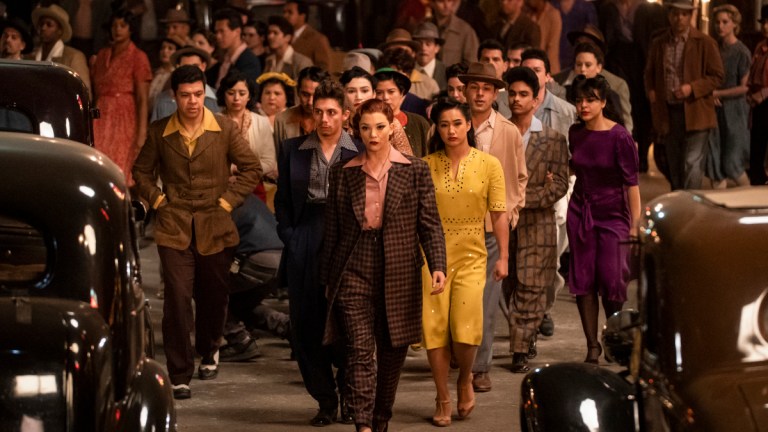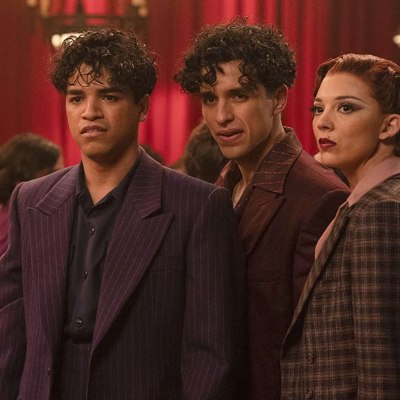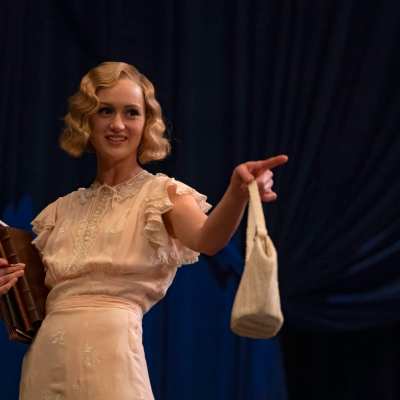Penny Dreadful: City of Angels Episode 10 Review – Day of the Dead
Penny Dreadful: City of Angels season finale honors departing friends on "Day of the Dead."

This Penny Dreadful: City of Angels review contains spoilers.
Penny Dreadful: City of Angels Episode 10
Penny Dreadful: City of Angels closes out the season in a strangely moving way, which is par for the course for a series like this. It’s not because of who and what is lost during the episode, but the movement of the arc which is thrown off-kilter. “Day of the Dead” opens with a funeral march which swings into an uprising. The repercussions will rattle Los Angeles heavily for days, but the implications will rearrange the urban landscape forever.
The future belongs to “big, fat men” like Mussolini, Huey Long and himself, Councilman Charlton Townsend (Michael Gladis) declares over a celebratory breakfast. The event which makes him so happy is the exact kind of thing someone in his position should be appalled by: a riot in the very city he has sworn responsibility to. The uprising accomplished what neither Townsend nor his rich daddy could do. Move the councilman move high enough up in the political world to roll more heads. Townsend completely loses whatever sympathetic collateral he may have built up from his emotional weight.
The episode opens with Santa Muerte (Lorenza Izzo) making her way into the Cheshire Cat. It’s interesting how the music goes from desultory to beautiful soft dance music as her presence gives way to the events on the ballroom floor. Detectives Tiago Vega (Daniel Zovatto) and Lewis Michener (Nathan Lane) swing most of the family, along with Sister Molly (Kerry Bishé), out of harm’s way. In last week’s episode, “Sing, Sing, Sing,” Tiago had a very chill scene at the bar with Fly Rico. Just a cop and a criminal getting drinks, knowing they’re going to go at it again in the morning. It’s like the movies of the time period. Edward G. Robinson, the cop, could drop in on Barton MacLane, a gangster, for a quick aperitif in Bullets or Ballots. They knew they’d be tossing bullets at each other the next day. The scene appears to be an homage to the entire trope. Fly Rico’s turnaround before the funereal march subliminally bonds him with Tiago as well. You can see the admiration, mixed with relief, in the young detective’s eyes.
Fly Rico wants the Pachucos to act as familia, not as the animals the cops are hoping for. Rio and Matteo are proud of their animal nature. Well, Rio is and she ultimately nurtures Tiago’s younger brother on the blood of heroic peacemakers. The revolution begins on stage with looks between the two more passionate revolutionaries. The Pachuco incarnation of Magda is plotting the entire time, looking for a fight or a way to start a war, and Natalie Dormer consistently allows herself to reveal and conceal her inner nature. She flashes her eyes outside the flesh box of the quick-tempered, zoot-suited instigator to let us in on how this is working on the political and spiritual level.
We actually see Tiago’s belief that Fly Rico has the situation under control. It registers before he goes out to join his brother on the street. The somber order of the takeover is actually what keeps the two brothers apart. But then something happens which hasn’t happened in the series before: Elsa and Rio, who are both Magda, see each other, communicate with a nod and a wink, and turn the order back into comforting chaos. The uprising scene is expertly done. The camera had already established the fleet is in, and the sailors’ white suits attacking the throng of angry mourners work both as a colorful counterpart and a visual allegory.
“When people start getting scared, they’ll allow anything,” Lewis says in the aftermath of the neighborhood violence as the streets have become militarized. “Goodbye freedom, hello Third Reich.” The Craft family, plus Elsa and her son, the living Munch painting, were ground zero of the street revolution as it spun out of control. “Why did they hurt me,” Frank Craft asks after being stitched up. “I never did anything to them. I hate them.” Dr. Craft (Rory Kinnear) gets it from both ends. His kid wants to hate and his girlfriend wants to hate. I was looking forward to a scene where Elsa and Peter spoke German, and the argument is more satisfying because of it. The heated exchange is charged, yet both characters are trying to hold back, and Dormer and Kinnear each stage emotional coups. Elsa wins, of course, because Peter is ultimately as weak as his first wife alleged. But also because Elsa is underplaying her anger in service to a grander scheme, she is at her best when manipulating.
There is another character beneath Elsa’s exterior, and again, Dormer occasionally lets her peak through the eyes. Peter’s last moment in the scene, which is the last we see of him for a while, is fraught with tortured ambiguity. He cannot believe what he’s hearing. He cannot believe what he’s gotten himself into. He loves this woman whose values go against his diametrically, and threatens his very family. Yet, when he hears the story of how she got there, he collapses inside himself. When Peter finally gives in and heils Hitler, it feels like a scene out of Invasion of the Body Snatchers. The only difference is in the 1950s conspiracy thriller classic, the infected parties get to sleep through their conversion. Craft endures the change while fully conscious. He weeps under the pressure, acknowledging his own cowardice.
Maria (Adriana Barraza) is nice to Benny Berman (Brad Garrett) in a satisfyingly warm scene. They obviously have respect for each other and an understanding which came from an instant rapport which happened off screen. Maria and Lewis hit it off instantly as well when they first met. Tiago, however, is a little tough on the mobster, dragging him away and basically spitting on any pleasantries. Cops and criminals don’t have to always be at each other’s throats, we saw that with how Tiago treats Fly Rico. Berman is only making dinner. Gangsters love to cook, especially those old time ones. “Crazy” Joe Gallo’s father used to bring pasta and sauce to the cops who were staking out his house. In The Godfather, Clemenza taught Michael Corleone to mix sugar and wine in his tomato sauce, both of which are sweeteners.
The gangster and the cop’s mom are only comparing recipes, but the young scientist they are protecting from his own goods has his own concoction cooking. He doesn’t know who he’s going to serve it up to, regardless of how much he wins at mahjong. “What bomb is this, Brian,” Lewis asks. One that’s like a thousand suns exploding all at once. “This is what you want to give the world?” I wonder about Brian’s ultimate destination, which I won’t detail even though the audience should see it coming five minutes before travel plans change. How long did Lewis know Brian wasn’t on his way to Manhattan for his project? As far back as when he was still stuck on Baja?
Early in the episode, while they are still worrying about racial realities ruining dreamy schemes, Molly tells Tiago she had four sisters who died before she was born. She fantasizes about bunk beds. Brought up among the crowds, she lives a lonely life she was raised to. The “dragon mother” is exactly that, and Detective Lewis was right when he said he wouldn’t put anything past her. Miss Adelaide reveals herself a monster in the background. God provided a strong right hand, no one will ever threaten her daughter. Not her former lover, John Hazlet, and possibly not the children Adelaide had before Molly, whose skulls may very well have been crushed by the mother to herald the second coming.
Tiago’s mother should have told him if he makes the same face too long, it gets stuck that way. From the moment we first see him being patched up by Sister Molly, he’s got a puss on. His arc is dead in the water. This actually works because, although he’s rejected Santa Muerte, he fully embraces her sister, Magda. Maria should have warned him about that as well. She’s had the pleasure of meeting the sister of the angel of death and bravely rejected her. Big spoiler coming, so think twice before moving forward. Sister Molly and Santa Muerte have a pivotal scene together. It is a touching scene, although we know what’s happening before it happens. The most interesting thing about it is Molly’s eyes, which seem to be losing life before we even see the tell-tale signs in the water.
The entire ending is shrouded in music, which makes it seem like it’s trying too hard to be significant. There’s a lot going on, so it makes sense to create a kind of montage, but it lacks the finesse of the series so far. When the storytelling was done in the dance sequences at the Cheshire Cat, it wasn’t done to encapsulate events, but as an emotional condensation. While it is interesting to tell a story without dialogue, it feels somehow rushed and glossed over.
Penny Dreadful: City of Angels ends the season like a book ends a chapter. There is finality and a promise of deeper and darker doings ahead. The season has been exemplary as a detective drama and subtly effective as a horror series. It obscures its occult inspirations but wears its social commentary on its sleeves. “They’re not building roads, they’re building walls,” Tiago says as the true evil takes a cue from real life. They couldn’t be more blatant if they tried. “Day of the Dead” is a fitting exhale before the series regroups on its path to social engineering. The episode ends with the same quote which opened the season, but now it looks like both brothers have become pawns in Magda’s apocalyptic army. The chips appear to have fallen in favor of a grim outcome.


